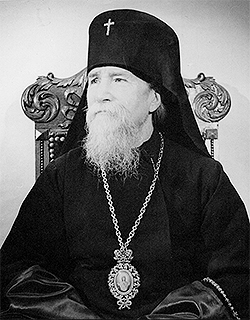Decree of Archbishop John (Maksimovich) of Brussels and Western Europe on the Commemoration of Archbishop Vitaly (Maksimenko)
Editor's Note: We bring to the attention of the readers of the website of the Russian Orthodox Church Outside of Russia "Decree No. 798 I960 to the clergy and flock of the Western European Diocese" on the occasion of the 150th anniversary of the birth of Archbishop Vitaly (Maximenko), born on August 8/21, 1873.
 On Monday of the Week of Exaltation of the Cross, March 8, 1960, His Eminence Vitaly (Maksimenko), Archbishop of Eastern America and Jersey, reposed in the Lord. On Monday of the Week of Exaltation of the Cross, March 8, 1960, His Eminence Vitaly (Maksimenko), Archbishop of Eastern America and Jersey, reposed in the Lord.
The deceased hierarch was a great ecclesiastical figure and a strong pillar of the Russian Orthodox Church. In his youth, ill and close to death, after he was tonsured into monasticism by the "father of the monks of the multitude", later Metropolitan Anthony (Khrapovitsky), he grew stronger physically and spiritually and really justified the name "Vitaly" he received during tonsure, which means "vital".
Full of spiritual life, he manifested it in his vigorous activity for the benefit of the Orthodox Church and her children, as well as for the benefit of Orthodox Russia and the Russian people. Holding the position of head of the printing house of the Pochaev Lavra, he showed himself to be a strong fighter for Orthodoxy, zealous for the strengthening of the surrounding population in the Orthodox faith and the return to it of the sons of Ruthenian Russia who had been forced into the Unia.
In the days of the first turmoil [1905 - ed.], he rallied the inhabitants of southwestern Russia to repel the turmoil and faithfully stand for the Faith, the Tsar and the Fatherland. In those days, he was a real spiritual and popular leader. After the collapse of the Russian State, he was in danger of his life for his past activities, but was able to leave for the diaspora, where he continued his ministry.
The Monastery of St Job of Pochaev, founded by him, and the printing house restored with it were important not only for Presovan and Carpathian Rus. He undertook the printing of liturgical books in the Diaspora, and other doctrinal and spiritually useful publications, with which the entire diaspora, regardless of division, was enriched, which made it possible to perform divine services everywhere.
As Archbishop of Eastern America, he was a shining beacon and pillar of Orthodoxy and a defender of the Russian Church, for the integrity and unity of the Russian people, while at the same time remaining a humble and ascetic monk. His activities covered all over the diaspora. With his spiritual gaze, however, he always embraced the whole of Russia.
It is the duty of all of us to offer prayers for him, to which we call upon all the clergy and flock.
|